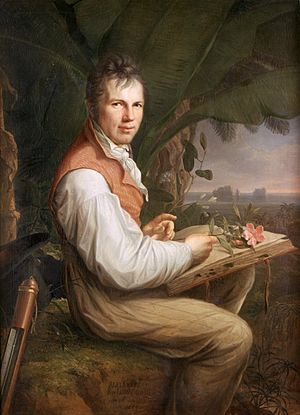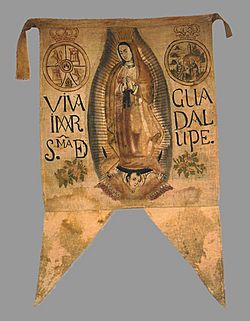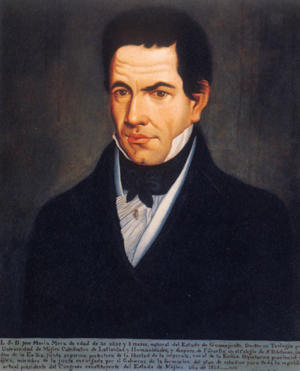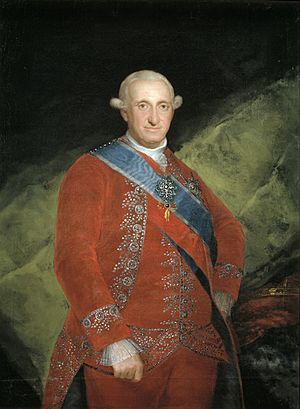Manuel Abad y Queipo facts for kids
Quick facts for kids Manuel Abad y Queipo |
|
|---|---|
| Bishop-elect | |
| Diocese | Michoacán, México |
| Enthroned | 1810 (not confirmed) |
| Reign ended | 1822 |
| Predecessor | Marcos de Moriana y Zafrilla |
| Successor | Juan Cayetano Gómez de Portugal y Solís |
| Personal details | |
| Born | 26 August 1751 Villarpedre, Asturias |
| Died | 15 September 1825 (aged 74) Toledo, Spain |
| Nationality | Spanish |
| Denomination | Roman Catholic |
Manuel Abad y Queipo (born August 26, 1751 – died September 15, 1825) was a Spanish Roman Catholic bishop. He was chosen to be the Bishop of Michoacán in New Spain (which is now Mexico). This was during the time of the Mexican War of Independence. He was known for his sharp observations about society in Mexico before it became independent. He was also seen as a very smart and modern church leader.
Contents
Early Life and Education
Manuel Abad y Queipo was born on August 26, 1751, in Santa Maria de Villarpedre, Spain. His father was a nobleman from Asturias. Manuel was born outside of marriage.
He studied law at the University of Salamanca in Spain. After finishing his studies, he went to Guatemala. There, he became a priest.
In 1784, he moved to Valladolid (which is now called Morelia) in New Spain. He worked as a judge in a church court. This job helped him learn a lot about the church's money and loans. In 1805, he earned another degree in church law from the University of Guadalajara.
In 1810, he was chosen to be the Bishop of Michoacán. However, his appointment was never officially approved by the Pope. Even so, he took on the role of leading the diocese. He held this position until 1815.
His Views on New Spain
Manuel Abad y Queipo was born in Spain, but he felt very connected to New Spain. He even said he was "an American by choice." He had strong opinions about New Spain and its place in the Spanish Empire.
He believed that the Spanish king had given equal rights to the native people of Mexico. He also thought that Spain had helped its American lands grow and become successful. He saw that there was a lot of unfairness in New Spain. He said that people were either very rich or very poor, which caused problems.
In 1799, he wrote a report to King Charles IV. In this report, he described the social and political problems in New Spain. He suggested several changes to make things better. These ideas included:
- Ending the taxes that native people had to pay.
- Giving away royal lands for free.
- Letting poor people rent unused land from large landowners without paying rent.
- Allowing factories to be built for cotton and wool.
He also spoke out against a law in 1804 that tried to take money from the church. He warned that this would harm farming and businesses in New Spain.

His ideas greatly influenced Alexander von Humboldt, a famous explorer and scientist. Humboldt visited New Spain from 1803 to 1804. Abad y Queipo shared his writings with Humboldt. Humboldt's important book, Political Essay on the Kingdom of New Spain, used many of Abad y Queipo's observations.
Abad y Queipo believed that the difficult situation of Mexico's native people was holding back progress. He thought this was not because of their character, but because of old laws that protected them too much. He was inspired by thinkers like Adam Smith and Montesquieu.
Role During the Mexican War of Independence
The Spanish government had made changes that upset many American-born Spaniards. They felt excluded from important jobs. Abad y Queipo understood this anger. He suggested that American-born Spaniards should be sent to Spain for education. He also thought they should be given high positions in government and the church.
In 1810, a priest named Miguel Hidalgo started a rebellion for Mexican independence. Abad y Queipo had been friends with Hidalgo. However, Abad y Queipo strongly opposed this violent uprising. He believed that the rebellion would destroy the social and economic progress he wanted for New Spain.
On September 24, 1810, Abad y Queipo announced that Hidalgo and other rebel leaders were excommunicated from the church. This meant they were no longer allowed to be part of the Catholic Church.

Some priests, like Hidalgo and José María Morelos, joined the rebels. But Abad y Queipo claimed that most priests stayed loyal to the Spanish king.
In 1815, Abad y Queipo sent another report to the new king, Ferdinand VII. He criticized the actions of the viceroy (the Spanish ruler in New Spain). Because of his liberal ideas, King Ferdinand called him back to Spain. Abad y Queipo was eventually confirmed as the Bishop of Michoacán, but he could not return to Mexico. After Mexico gained independence in 1821, he resigned from that role.
Return to Spain and Later Life
When he returned to Spain, King Ferdinand VII pardoned him. The king even made him a minister in the government. But soon after, the Inquisition (a church court) accused Abad y Queipo of being friends with rebels and having revolutionary ideas. He was put in jail for two months.
In 1820, there was a revolution in Spain. The liberal Spanish Constitution of 1812 was brought back, making Spain a constitutional monarchy. Abad y Queipo became part of a temporary government group. He was even a representative for his home province of Asturias. He was later named Bishop of Tortosa, but again, his appointment was not officially approved by the Pope.
In 1824, King Ferdinand VII returned to full power. Abad y Queipo was old and deaf by then. He was imprisoned again, this time in a monastery. He died as a prisoner in 1825.
Writings and Impact

Many of Manuel Abad y Queipo's writings were published in newspapers and journals. His important collection of writings was published in Mexico City in 1813. His "Political Testament" was included in a history book by Lucas Alamán.
His observations about New Spain greatly influenced Alexander von Humboldt's famous book. Abad y Queipo's ideas also had a big impact on Mexican liberalism after Mexico became independent. A liberal thinker named José María Luis Mora republished his works. This helped ensure that Abad y Queipo's ideas influenced the development of modern Mexican thought. He is seen as a key thinker behind Mexican liberalism.
Images for kids
-
Alexander von Humboldt, whose book about New Spain was influenced by Abad y Queipo's ideas
-
A banner with the image of Our Lady of Guadalupe carried by Miguel Hidalgo and his followers. Abad y Queipo said this was wrong.
See also
 In Spanish: Manuel Abad y Queipo para niños
In Spanish: Manuel Abad y Queipo para niños
 | Emma Amos |
 | Edward Mitchell Bannister |
 | Larry D. Alexander |
 | Ernie Barnes |





